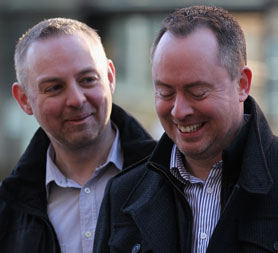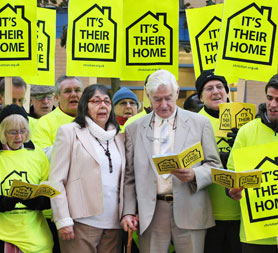Gay couple win hotel discrimination case
Christian B&B owners who refused to allow a gay couple to stay in a double room at their hotel acted unlawfully, a judge rules.

Peter and Hazelmary Bull broke the law when they denied Martyn Hall and his civil partner Steven Preddy a shared room at their hotel in Cornwall in September 2008, a judge ruled today.
The couple were awarded £1,800 each in damages by Judge Andrew Rutherford in a written judgment at Bristol County Court.
Mr Hall and Mr Preddy, from Bristol, were seeking up to £5,000 damages claiming sexual orientation discrimination under the Equality Act (Sexual Orientation) Regulations 2007.
At a hearing last month, the hotel owners denied the claim, saying they had a long-standing policy of banning all unmarried couples both heterosexual and gay from sharing a bed.
Mr Bull, 70, and his wife, 66, said their policy at the Chymorvah Private Hotel in Marazion near Penzance, was based on their Christian beliefs towards marriage and not about sexual orientation.
Mr Preddy, 38, said he and Mr Hall, 46, had booked the hotel room over the phone and were not aware of the policy until they arrived and were told by a hotel employee they would not be able to stay.
Today Judge Rutherford rejected one of the claims made in court that the booking had been a “set-up” due to the nature of the booking.
After today’s ruling Mrs Bull said she was disappointed by the decision, adding that an appeal would be discussed with their legal team.
‘Disappointed’
Mr Bull was unable to attend court for the judgment today as he is due to undergo surgery for a triple heart bypass.
“We are obviously disappointed with the result. Our double-bed policy was based on our sincere beliefs about marriage, not hostility to anybody,” she said.
“It was applied equally and consistently to unmarried heterosexual couples and homosexual couples, as the judge accepted.
“We are trying to live and work in accordance with our Christian faith. As a result we have been sued and ordered to pay £3,600.
“But many Christians have given us gifts, so thanks to them we will be able to pay the damages.”

Mrs Bull (pictured right with her husband and supporters in December) added that she felt “Christianity is being marginalised in Britain”.
“The same laws used against us have been used to shut down faith-based adoption agencies,” she said.
“Much is said about ‘equality and diversity’ but it seems some people are more equal than others.”
The Bulls legal defence was supported by the Christian Institute while Mr Hall and Mr Preddy were backed by the Equality and Human Rights Commission.
John Wadham, from the Equality and Human Rights Commission, welcomed the ruling.
“The right of an individual to practise their religion and live out their beliefs is one of the most fundamental rights a person can have, but so is the right not to be turned away by a hotel just because you are gay,” he said.
“The law works both ways. Hotel owners would similarly not be able to turn away people whose religious beliefs they disagreed with.”
Judgement
In his ruling, Judge Rutherford said that, in the last 50 years, social attitudes in Britain had changed.
“It is inevitable that such laws will from time to time cut across deeply held beliefs of individuals and sections of society for they reflect the social attitudes and morals prevailing at the time that they are made.
“In the last 50 years there have been many such instances – the abolition of capital punishment; the abolition of corporal punishment in schools; the decriminalisation of homosexuality and of suicide; and on a more mundane level the ban on hunting and on smoking in public places.
“All of these – and they are only examples – have offended sections of the population and in some cases cut across traditional religious beliefs.
“These laws have come into being because of changes in social attitudes. The standards and principles governing our behaviour which were unquestioningly accepted in one generation may not be so accepted in the next.
“I am quite satisfied as to the genuineness of the defendants’ beliefs and it is, I have no doubt, one which others also hold.
“It is a very clear example of how social attitudes have changed over the years for it is not so very long ago that these beliefs of the defendants would have been those accepted as normal by society at large. Now it is the other way around.”